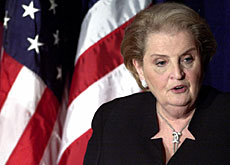Swiss banks shut out of oil-for-food contracts

Swiss banks have declined to comment on revelations that they were barred from a key role in the Iraq oil-for-food programme - at the bidding of the United States.
An interim report into the United Nations-run programme reveals that former US secretary of state Madeleine Albright intervened to prevent tenders for financial oversight being awarded to Credit Suisse or UBS.
Geneva-based testing and inspection company SGS also lost out to a competitor in the Netherlands according to the report, which was published in New York on Thursday.
The report says Credit Suisse would have been best qualified for the work on the basis of the criteria set by the UN.
However, the 1996 contract was nonetheless awarded to French rival Banque Nationale de Paris (BNP).
Albright is quoted as saying it would be a “mistake” to award the contract to a Swiss bank, for three specific reasons.
Lack of transparency
First, she said Swiss banking legislation – particularly provisions relating to banking secrecy – was not sufficiently transparent.
Second, as Switzerland was not (at the time) a UN member state, its involvement would create additional complications for implementation of a UN resolution.
Third, Albright said Iraqi president Saddam Hussein and his family had private bank accounts in Switzerland.
The final decision about which bank won the tender was taken by the then UN secretary-general Boutros Boutros-Ghali.
In a letter to the investigating commission, he wrote: “The choice of BNP was made with the agreement of the US and Iraqi delegations.
“It was a political decision.”
The report adds that Boutros-Ghali held a meeting with the French ambassador to the UN shortly before the decision was taken.
Credit Suisse and the Swiss Bankers’ Association both declined to comment on the latest revelations.
Political decision
The oil-for-food programme ran from 1996 until 2003, when it was ended following the US-led invasion of Iraq.
Under the scheme, Saddam Hussein was able to use the proceeds from oil sales to buy humanitarian goods and to ease the impact of UN Security Council sanctions imposed after the 1991 Gulf War.
The latest report was published following an investigation into claims that individuals and firms from around 50 countries helped the Iraqi leader to profit from the scheme.
Mark Pieth, a Basel University law professor who co-authored the report, told swissinfo that the procurement decisions necessary to set up the oil-for-food programme had been “extremely politicised”.
Disregarded
He added that UN officials had systematically disregarded established procedures in order to please some member states, especially the permanent members of the Security Council.
The 1996 contract decision was taken at a time when Credit Suisse and main Swiss rival UBS were becoming involved in a major international controversy concerning Nazi-era bank accounts.
In 1998, the Swiss banks agreed to pay $1.25 billion to settle all claims from Holocaust survivors and others who argued that they had suffered as a result of the Swiss institutions’ handling of accounts held during the Second World War.
swissinfo, Chris Lewis
The Independent Inquiry Committee report investigated claims that Saddam Hussein illegally pocketed more than $5 billion from the UN oil-for-food scheme.
Numerous individuals and firms are suspected of helping the former Iraqi leader in return for kickbacks.
The oil-for-food programme ran from 1996 until 2003.

In compliance with the JTI standards
More: SWI swissinfo.ch certified by the Journalism Trust Initiative










You can find an overview of ongoing debates with our journalists here . Please join us!
If you want to start a conversation about a topic raised in this article or want to report factual errors, email us at english@swissinfo.ch.